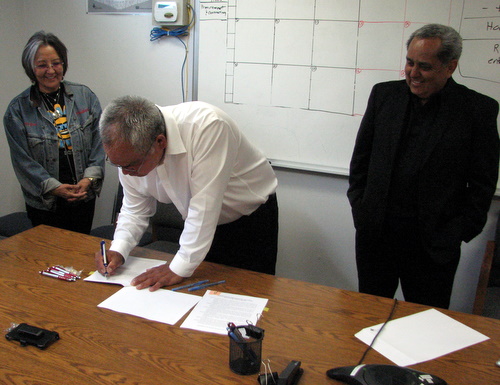
Robert Woolsey, KCAW.org
Sealaska and the Sitka Tribe have reached an agreement on the management of Redoubt Lake Falls — when, and if, the property is ever conveyed by the federal government.
Representatives from both organizations met in a signing ceremony Friday afternoon (6-14-13) in Sitka.
Listen to iFriendly audio.
Redoubt Falls lies about 17 miles southeast of Sitka. It’s home to the largest subsistence dipnet salmon fishery in the area.
Sealaska selected the few acres around the falls 38 years ago, under rules spelled out in the Alaska Native Claims Settlement Act, or ANCSA.
Former state Sen. Albert Kookesh is chairman of the Sealaska board.
“This is a process set up by the United States government to allow us to get control of our sacred sites. It doesn’t work very well.”
Still, there has been some movement recently on the Redoubt selection. A Bureau of Land Management survey of the property was done in 2011. And the trustees of Sheldon Jackson College filed a color of title claim, saying some of the area had been deeded to the school, following the sale of Alaska from Russia to the United States.
Kookesh regarded the Sitka signing ceremony — which has no effect whatsoever unless the BLM conveys the land to Sealaska — as a demonstration of Sealaska’s intention to keep sacred tribal lands under the control of local tribes — if not in their ownership.
He told the small audience gathered in the Sitka Tribe conference room that corporate ownership was the only tool available to tribes to regain control over traditional lands.
“We really want to make sure that the Sitka Tribe, and other tribes, understand that we don’t want to own it. But by circumstances we have to own it — we’re the only train left at congress that management of sacred sites can come to.”
Corporate ownership of public lands — particularly at a major sockeye run — has been polarizing in Sitka.
Sealaska vice-chair Rosita Worl repeated a theme that the corporation has emphasized at public meetings on the issue: ANSCA guidelines on the use of sacred sites are clear.
“It can’t be for any kind of commercial development. It can continue to be used for a subsistence fishery. And we know that the site is really important not only to tribal members, but to the public at large. This agreement recognizes that the public will continue to have access to that site for a subsistence fishery.”
The four-page memorandum of agreement was signed by former Sen. Kookesh on behalf of Sealaska, and by Tribal Council chairman Mike Baines.
Afterwards, Worl discussed why Redoubt was sacred. She said she’d been down to visit the falls.
“I could feel the essence of that site. I could imagine the long use of it by our ancestors. I’m also aware that it was a site used by the Russians, and so there is that part of history that is there. Although that doesn’t have the kind of sacred dimensions, we do recognize the significance of the Russian occupancy.”
Sitka Tribal chairman Mike Baines said his organization had no immediate plans for Redoubt, if Sealaska were to finally receive the land. But he acknowledged that there were possibilities for cultural education in the area.
For him, signing the management agreement was about fulfilling the mission of his office.
“When we say our oath of office on the council, one of the most important things is that we’ll work to protect the traditional resources of the Tlingit in the area. And Redoubt is one of those resources — so that’s what we plan to do.”
The management agreement will not affect the Forest Service, and the $100,000 taxpayer funded lake fertilization program. Sealaska’s Worl said she hoped the federal government continued to pay for the program.
Separate Sealaska land selection legislation, affecting nearly 70,000 acres of timberlands on the Tongass, and another 80 sacred sites, is currently before Congress.
